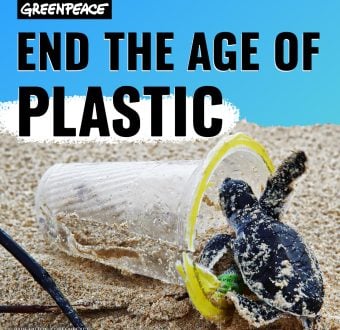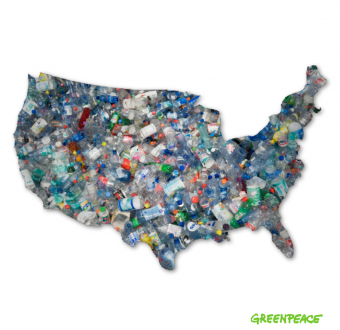Washington, DC – Over 115 health experts from 18 countries, including virologists, epidemiologists, emergency room doctors, and specialists in public health and food packaging safety, signed onto a statement today addressing the safety of reusable bags and containers during the COVID-19 pandemic. The statement, released by Greenpeace USA and UPSTREAM — members of the Break Free From Plastic movement, assures retailers and consumers that reusable systems can be utilized safely by employing basic hygiene and creating contact-free options for customers’ personal bags and cups. The statement follows several temporary pauses on plastic bans across the country and some bans on reusables during COVID-19.
“Public health must include maintaining the cleanliness of our home, the Earth,” said Dr. Mark Miller, former director of research at the National Institutes of Health’s Fogarty International Center. “The promotion of unnecessary single-use plastics to decrease exposure to COVID-19 negatively impacts the environment, water systems, and potential food supply compared to the safe use of reusable bags, containers, and utensils.”
The experts’ statement notes that disposable products are not inherently safer than reusables, and that recent studies have shown the virus can remain active on plastic from two to six days. It also states that household disinfectants have been proven effective at disinfecting hard surfaces, such as reusables. The best practices urged by the experts include complying with food safety/health codes for sanitizing, using additional hygienic practices during the pandemic, utilizing contact-free systems, and ensuring that workers are adequately protected.
“Since the early days of this pandemic, the plastic industry has been working to promote unnecessary throwaway plastics and scare people away from reusable bags and other items,” said Greenpeace USA Oceans Campaign Director John Hocevar. “It is important for businesses and governments to know that as they reopen, reusable systems can be deployed safely to protect both our environment, customers, and workers. Choosing to act on bad advice from the plastic industry rather than the best available science will not keep people safe and will make our climate and plastic pollution crises even worse.”
In recent weeks, the U.S. Centers for Disease Control and Prevention (CDC) updated its guidance to note that the virus does not spread easily through contact with surfaces or objects, but out of an abundance of caution for workers, experts have encouraged people to bag their own groceries and handle their own reusables during the pandemic. Despite no known cases of COVID-19 from surface contact, the CDC also published guidance urging restaurants to consider using disposables upon reopening, which could lead to “ecological disaster” and increased impacts to low income communities of color hit hardest by COVID-19 and the plastics crisis.
“Over the past few months, there’s been a lot of conflicting information about how the virus is spread, but we now know that surfaces are not the main way we’re exposed,” said Matt Prindiville, CEO of UPSTREAM – a nonprofit sparking innovative solutions to plastic pollution. “Plastic harms our health along the entire supply chain. Fortunately, the coronavirus is easily destroyed by proper washing, so restaurants, grocery stores and other businesses can still serve us using reusable items in ways that protect health without harming the environment.”
Throughout the COVID-19 pandemic, the plastic industry has worked to boost its profits and demonize reusables. Pauses on plastic bans followed a significant PR push from the plastics industry, using older industry-funded research to claim that reusables are more dangerous than disposables during COVID-19. The industry also asked the U.S. government to put out a statement of support around the safety of single-use plastics and weighed in to urge elected officials to provide a $1 billion bailout for recycling infrastructure so that it can continue increasing plastic production.
Even as the industry has exploited the COVID-19 crisis to push single-use packaging, consumer sentiment remains strongly against unnecessary plastics. Reusable systems with strong sanitization systems, including Loop, have also seen their customer bases expand during the pandemic as demand increases.
The full statement signed by health experts can be found here: https://www.greenpeace.org/
###
Contact: Perry Wheeler, Greenpeace USA Senior Communications Specialist, [email protected], P: 301-675-8766
Vanessa Tiongson, UPSTREAM Marketing & Communications Director, [email protected], P: 813-438-4956


